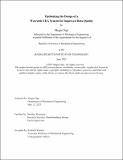| dc.contributor.advisor | Kosmyna, Nataliya | |
| dc.contributor.author | Ngo, Megan | |
| dc.date.accessioned | 2023-08-23T16:11:23Z | |
| dc.date.available | 2023-08-23T16:11:23Z | |
| dc.date.issued | 2023-06 | |
| dc.date.submitted | 2023-07-18T16:17:25.063Z | |
| dc.identifier.uri | https://hdl.handle.net/1721.1/151823 | |
| dc.description.abstract | This thesis aims to evaluate the impact of various form factors and magnetic interference on the quality of EEG signals acquired by a wearable EEG device. In order to determine an optimal design that minimizes artifact contamination, various cognitive tasks were observed, and users provided feedback while data was collected. Signal quality was assessed based on the distribution of power across specific frequency bands. The EEG data collected from the glasses demonstrated high sensitivity in detecting brain activity while in the proximity to magnets. Limitations in distinguishing between different brain states were observed due to increased impedance and noise from the design changes. The results thereby call for further investigation and testing to isolate artifacts and improve the wearable EEG technology. | |
| dc.publisher | Massachusetts Institute of Technology | |
| dc.rights | In Copyright - Educational Use Permitted | |
| dc.rights | Copyright retained by author(s) | |
| dc.rights.uri | https://rightsstatements.org/page/InC-EDU/1.0/ | |
| dc.title | Optimizing the Design of a Wearable EEG System for Improved Signal Quality | |
| dc.type | Thesis | |
| dc.description.degree | S.B. | |
| dc.contributor.department | Massachusetts Institute of Technology. Department of Mechanical Engineering | |
| dc.identifier.orcid | https://orcid.org/0009-0005-0554-5020 | |
| mit.thesis.degree | Bachelor | |
| thesis.degree.name | Bachelor of Science in Mechanical Engineering | |
